The health & economic impact of the coronavirus has been unprecedented and unavoidable on people and organizations. The past couple of months has brought a drastic change in our personal and work lives, bringing HR practitioners in the spotlight to deal with people issues and disrupted workplace operations.
Business owners and HR leaders are responding in unique ways to deal with this crisis. Tuscan Consulting decided to collect first-hand information on how HR is responding to the impact of Covid-19 in the UAE and over 400 respondents provided their inputs in a weeks time.
Ever since the advent of covid-19, HR teams are working tirelessly to support their people and organisations. HR leaders are making tough decisions with limited and fast moving information. So we decided to compile this report to provide insights, priorities and actions points for HR to respond and mitigate the impact of coronavirus as well as explore what other organizations are doing in the UAE.


The economic impact of Covid-19 has been significant on almost all business sectors. Our survey results have revealed 71% organizations in the UAE are negatively impacted by the pandemic, 17% organizations are positively impacted and 12% organizations had no economic impact.
Although majority of the sectors have seen a negative economic impact, not all sectors are affected equally. Some sectors have taken a higher economic toll than the others. Sectors like airlines, travel, entertainment, fitness and services have seen a higher economic impact, while healthcare, education, banking, manufacturing and maintenance sectors have been lesser impacted so far. We understand that this graph is likely to change in the coming months depending on the restrictions and social distancing measures adopted in the UAE. Our analysis represents the impact in the initial 8 weeks of the pandemic.
The widespread economic impact is reflected in declining sales and revenues of organizations with organizations resorting to cut operating costs wherever possible. Our survey reflects 48% organizations are finding it extremely challenging to maintain sales and revenues, 19% finding it very challenging, 18% moderately challenging, 7% slightly challenging and 8% not challenging to maintain sales and revenues.

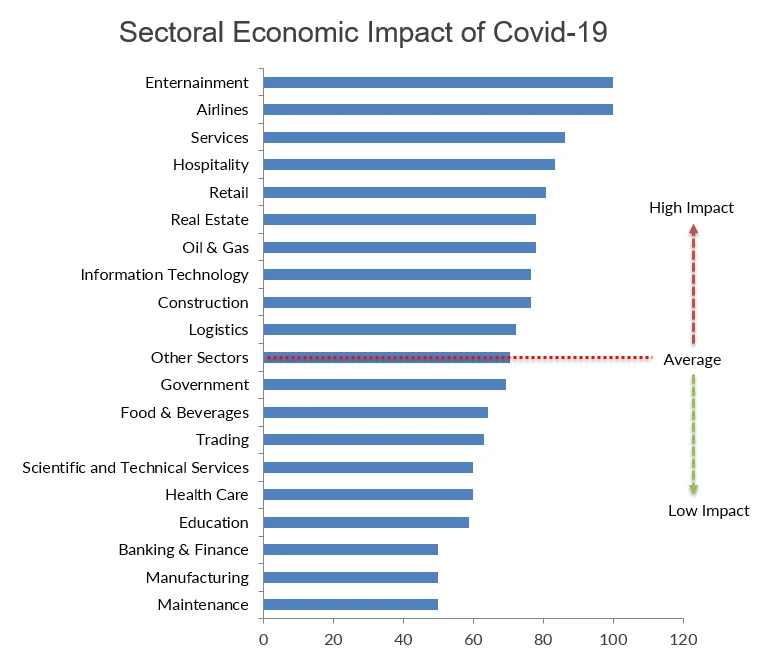
Organizations with preparedness and planning are able to better respond to the business impacts of this pandemic. Forward thinking organizations that had contingency plans, emergency response teams, remote working and technology setup are always prepared to deal with some sort of workplace disruptions.
As per our survey 50% of UAE organizations were prepared before Covid-19 was declared a pandemic, i.e. they had some sort of contingency plan or an emergency team to respond. These organizations have responded little better than the others who were not prepared (66% negative economic impact compared to 71% overall). These organizations will be able to comeback relatively quicker and better prepared when workplaces fully reopen.
There is a need for HR to be more proactive now and in future, in dealing with workplace disruptions. With easing of restrictions in the UAE and across the world a phased return to work is imminent. HR professionals should be preparing return to work plans. Preparedness for reopening of offices with adequate precautions, communication for on-site and remote staff requirements, coordination with health & safety teams, social distancing policies in the workplace etc. will help in safe and quick return to workplace.

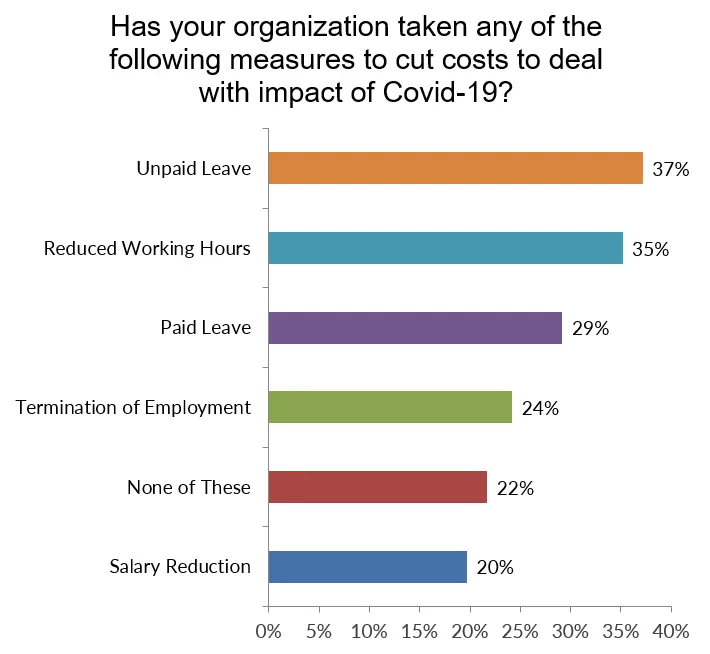
The UAE government has done an excellent job by introducing the Ministerial Decision No. 279/2020 in wake of the Covid-19 outbreak. This decision has guided both employers and employees on fairly and legally dealing with the current crisis. Employers are advised to take lighter measures before taking any drastic actions. Employers can at the first step ask employees to work remotely or consume all paid annual leave. Implementation of unpaid leave and amendment of employment contract for a temporary or permanent reduction in salary requires employee consent, with a permanent amendment being necessarily registered with MOHRE.
Our survey has revealed 37% organizations have asked employees to take unpaid leave. 35% organizations have reduced working hours for employees. 29% organizations have offered paid leave. 24% organizations have terminated at least some employment contracts so far. 22% have not taken any measures to reduce costs. While 20% organizations have reduced staff salaries.
With all the negative measures that organizations have been forced to take employee anxiety, insecurity and productivity are becoming a top concern for HR to tackle.
In the first phase, from Mid-March 2020 to May 2020 ( in what we call The Shock Period) most organizations have resorted to paid leave & unpaid leave and reduced working hours, while 20% organizations have opted to renegotiate and reduce staff salaries. However this may change as paid leave options are exhausting and there is a phased return to work but with lower number of staff in office and more staff still working remotely in the coming months.
In the second phase, from June 2020 onwards (in what we call The Adaptive Period) 57% organizations are planning to revise compensation and benefits. HR teams are likely to be involved in more difficult conversations in the coming months. It is advisable for all HR practitioners to have dialogue, show empathy and take employee consent and ensure legal compliance for any drastic measures on salary and benefits.
Our survey also finds that only 13% organizations may provide usual salary increments or on-target bonuses this year. 42% organizations have said they have stopped increments / bonuses for this year, 32% were not yet sure on whether there will be any increments or bonuses while 13% did not have an annual increment or bonus policy.
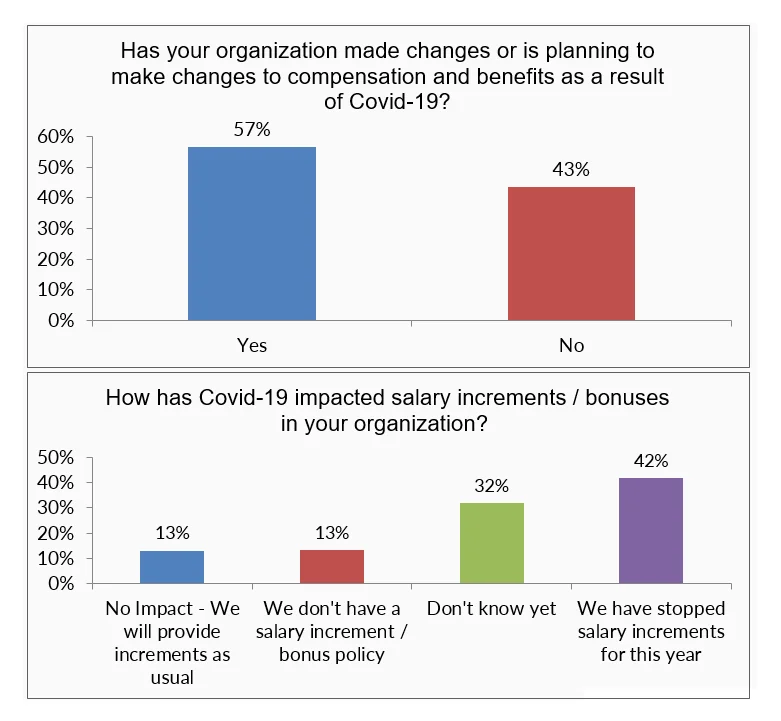
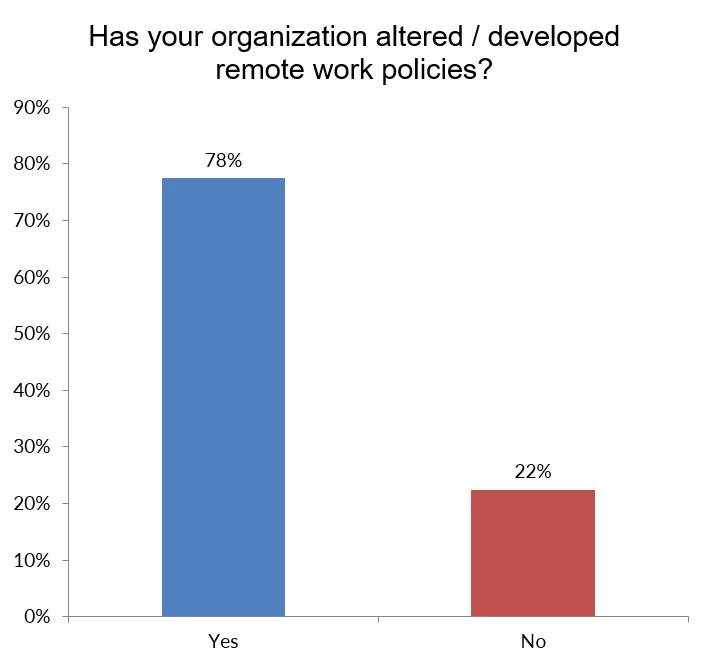
Like it or get used to it, remote working may be the new normal for an expanded category of employees even post Covid-19 our research suggests. Organizations have realized, new categories of employees previously never considered for remote working, could also work remotely with the help of technology.
78% organizations in the UAE have changed or developed new remote work policies whilst 22% did not. We expect more organizations to incorporate remote work policies in the coming months.
The new trend of increased remote working will considerably change the business landscape as well as the way HR operates currently and deals with several work practices.
Once work life resumes to normal post Covid-19, employers would have seen and weighed the pros of cons of remote working. Organizations can expect savings on office space, travel costs and travel time, increased employment of specialized remote staff and more inclusion of women in the workplace. On the negative side organizations will be concerned about employee anxiety, insecurity and productivity and in some cases non-exclusive work contracts, confidentiality issues etc. The current trends are suggesting the benefits will outweigh the concerns in the long term. With substantial changes in workflows and investment in remote working expanded to a larger employee base, we can expect not all of these employees will return to normal office routine post Covid-19.
Our survey reveals 46% organizations in the UAE have mandated employees to work from home. 43% have closed some or all offices for time being. 41% have expanded the type of employees who can work from home. 32% have encouraged employees to work from home but did not make it mandatory. 26% have reduced daily working hours for employees. 16% have changed or relaxed sick leave policy for employees who may need to isolate or test positive for Covid-19. 15% organizations have reduced working days in a week. While 11% do not have a remote work policy.
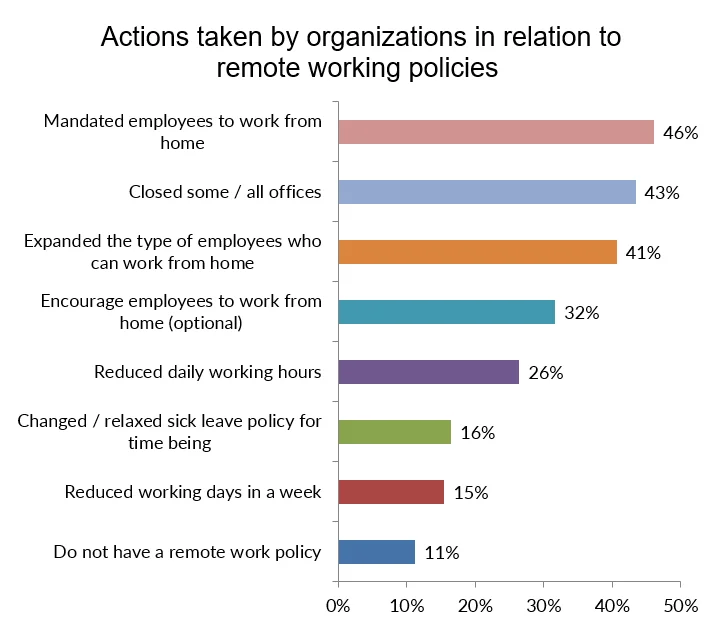
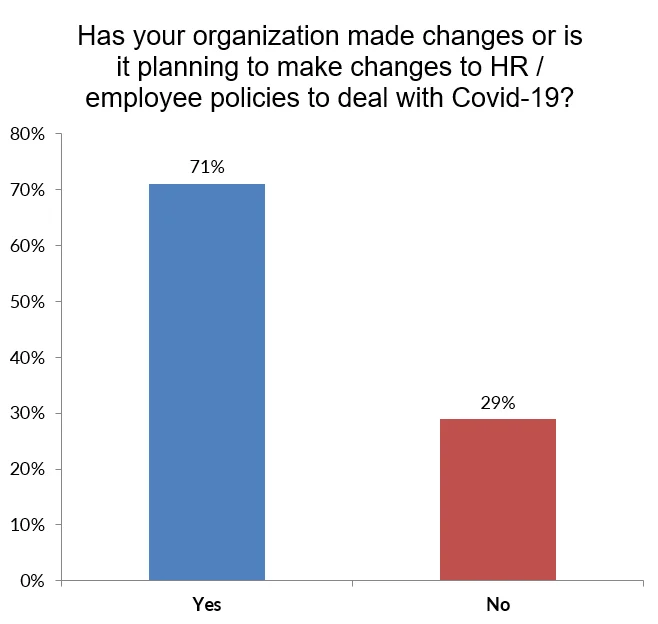
The current crisis has impacted several work practices at the same time. HR leaders are required to make quick decisions which have significant impact on employees personal and work lives. The UAE government is also changing labour legislations to accommodate the new norms. In such a situation it is necessary for organisations to revisit HR policies and processes.
Our survey has revealed 71% organizations in the UAE have either changed or are planning to make changes to HR policies. The remaining 29% may follow in the coming months.
HR policies and processes most organizations need to revisit includes:
1. Recruitment & Onboarding
2. Remote Working
3. Working hours
4. Leave
5. Salary & Benefits
6. Performance Management
7. Training & Development
8. Information Technology
9. Health & Safety
10. Return to work
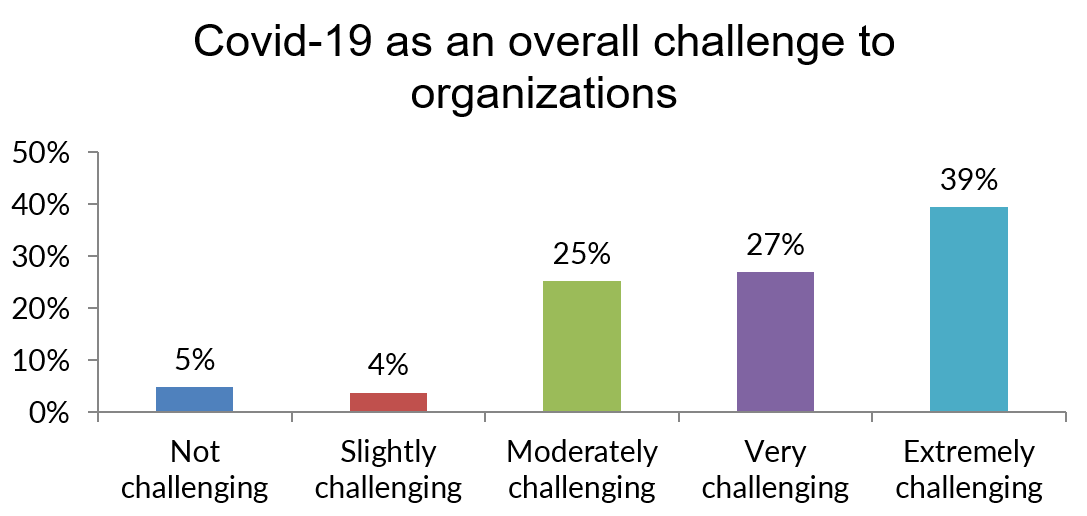
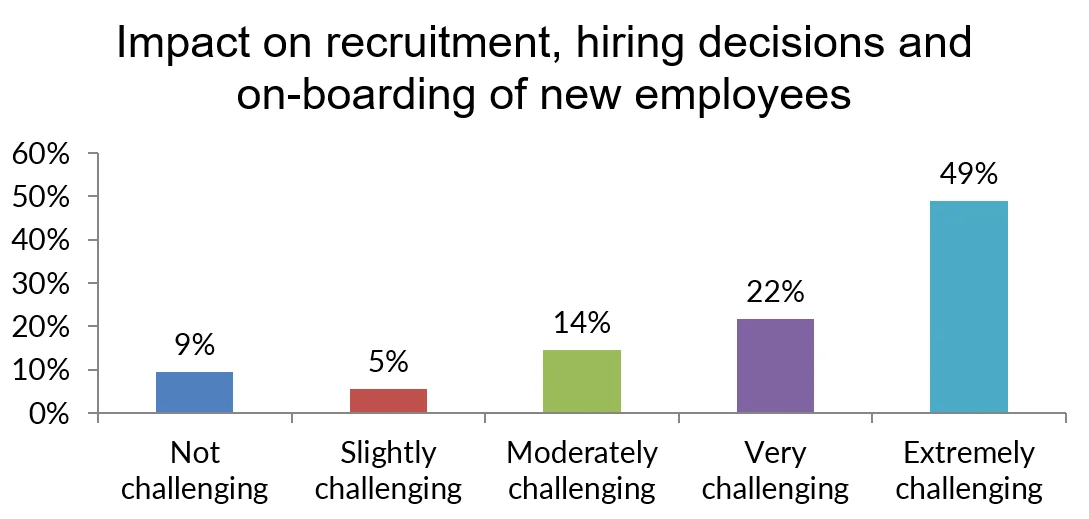
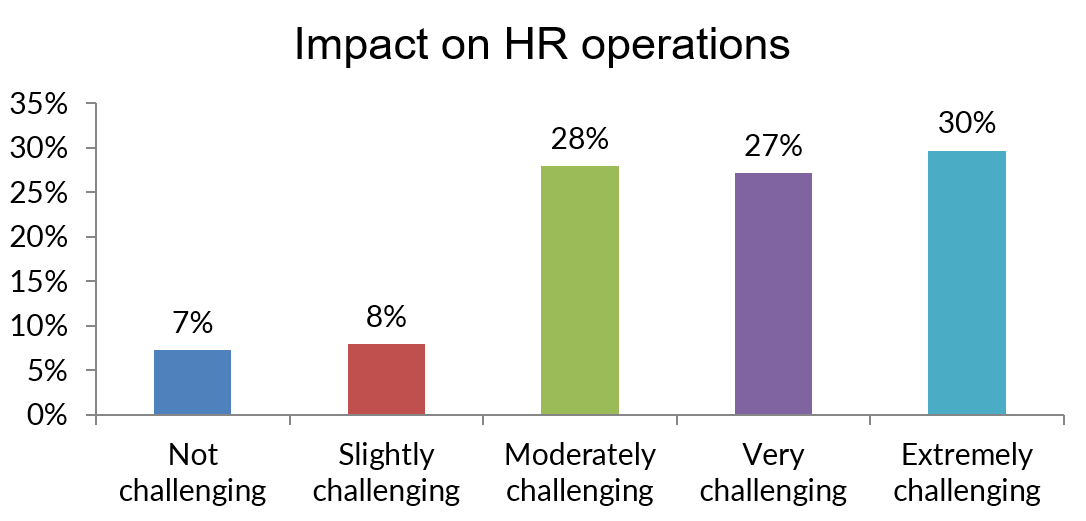
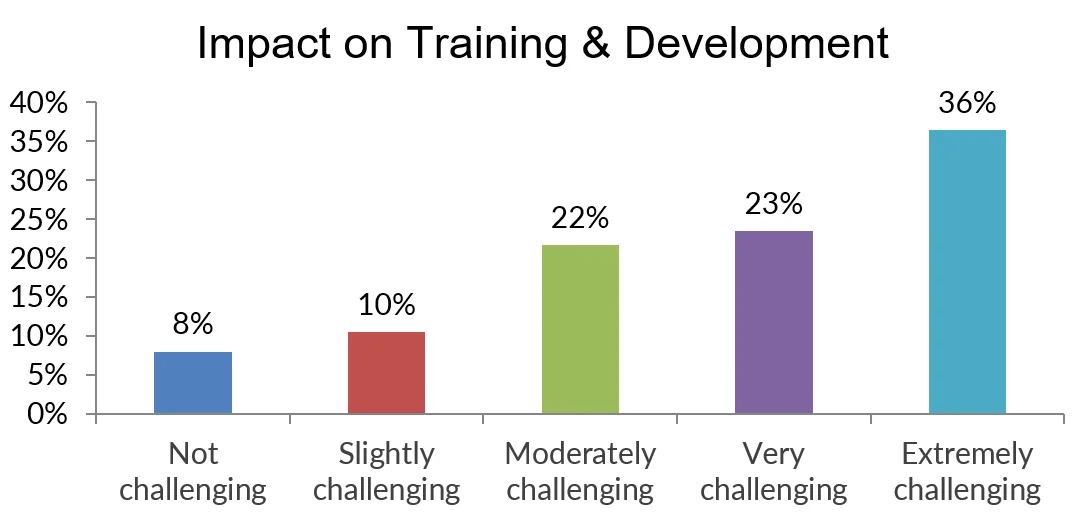
The goals and KPIs set at the beginning of 2020, may not be relevant any more. Managers will have to find effectives ways of delivering feedback and coaching employees remotely. The performance review as well as rating process will also need changes. Eventually there will also be a shift in the way employees will get rewarded for their performance in light of the current crisis.
HR leaders need to revisit their perspectives on performance, coaching, learning and rewarding. Our survey has found 53% organizations have not made changes to their performance management process and goals whilst 47% have already initiated changes. As organizations get more clarity on easing restrictions and return to work instructions, we expect more organizations to revise their performance management processes and goals.
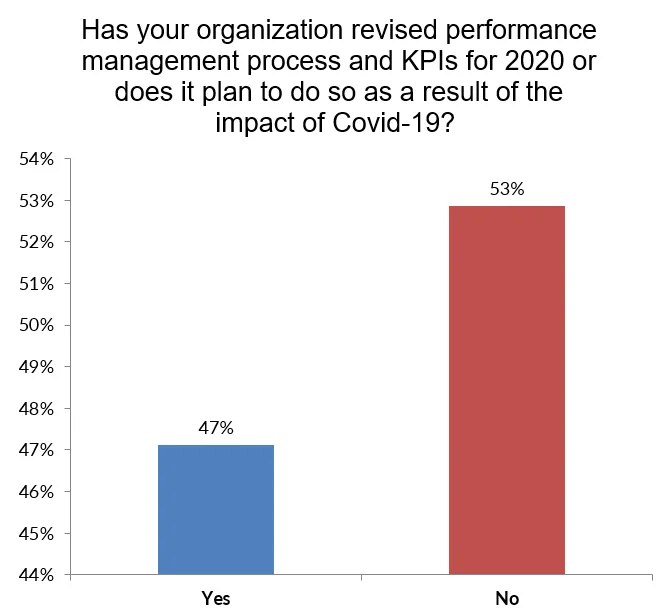
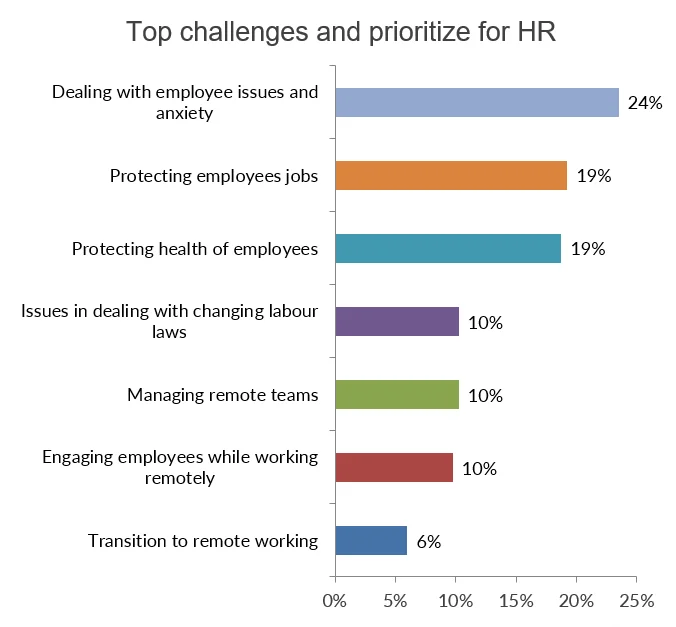
We asked HR leaders on their top challenges and prioritize as a result of the current crisis.
First: Dealing with employee insecurities and anxiety remained a top challenge for 24% HR leaders. Employee mental health has suddenly become the most important concern where some large organizations have also started providing teleconsultation for counselling employees on stress and anxiety. Many HR practitioners are faced with the double challenge of maintaining their own stress and anxiety levels while supporting employees with theirs.
Second: The next most important challenges for HR leaders were protecting employee jobs (19%) and employee health (19%), given the economic toll and health risks poised by the pandemic.
Third: Keeping up with legislations (10%), managing remote teams (10%) and engaging employees in remote work environment (10%) remained third biggest challenges for HR leaders.
Fourth: Transition to remote working remained the next big challenge for 6% HR leaders.
HR practitioners in the UAE are mostly satisfied with the way their organizations have responded and handled the Covid-19 crisis. 20% believe their organization has done much better than others. 29% believe their organization has done better than others. 32% believe their organization has done about the same as others. 11% believe their organization has done worse while 7% believe their organization has done much worse than others.

All the HR trends for 2020 written earlier in the year, could not predict anywhere close to how personal and work lives have changed after the Covid-19 pandemic. HR practitioners in the UAE have been pushed as frontline communicators for employees in these turbulent times. The role of HR has become more significant than before due to the workplace disruptions caused by the pandemic.
The impact of all HR decisions is also significant on employees lives in the current crisis. Thus, there is an urgency to act and continuously shift gears as the situation evolves. Some of the things HR should focus in the coming months include:
1. Prepare return to work plans
2. Accelerate digital transformation
3. Review HR policies
4. Review performance management processes
5. Consider changing legislations when dealing with leave, salaries, redundancies
etc
6. Practice empathy, values and ethics as the crisis is temporary after all and
employees will remember
the way in which organizations treat them now. This will determine future success.
7. Adopt a practical and tactical approach